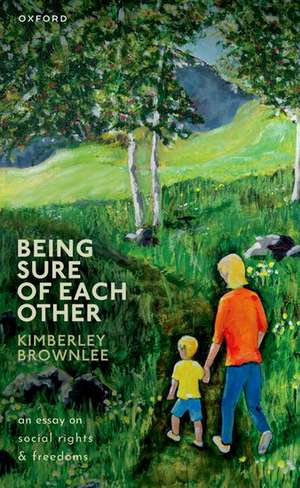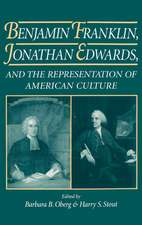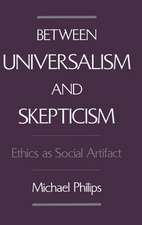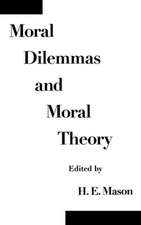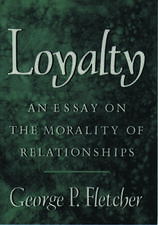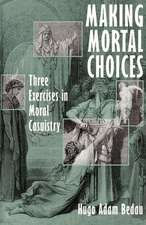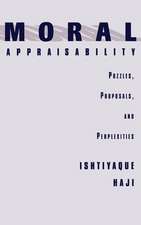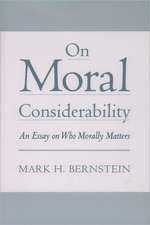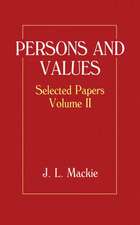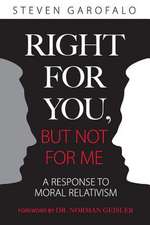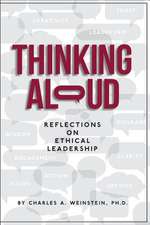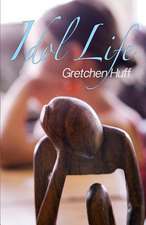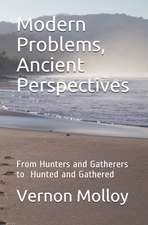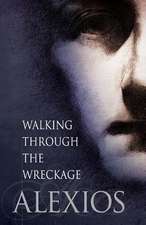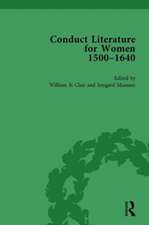Being Sure of Each Other: An Essay on Social Rights and Freedoms
Autor Kimberley Brownleeen Limba Engleză Paperback – 26 ian 2023
| Toate formatele și edițiile | Preț | Express |
|---|---|---|
| Paperback (1) | 159.11 lei 11-16 zile | |
| OUP OXFORD – 26 ian 2023 | 159.11 lei 11-16 zile | |
| Hardback (1) | 369.33 lei 11-16 zile | |
| OUP OXFORD – 26 mai 2020 | 369.33 lei 11-16 zile |
Preț: 159.11 lei
Preț vechi: 179.45 lei
-11% Nou
Puncte Express: 239
Preț estimativ în valută:
30.45€ • 32.56$ • 25.39£
30.45€ • 32.56$ • 25.39£
Carte disponibilă
Livrare economică 17-22 martie
Preluare comenzi: 021 569.72.76
Specificații
ISBN-13: 9780198874898
ISBN-10: 0198874898
Pagini: 256
Dimensiuni: 133 x 215 x 14 mm
Greutate: 0.32 kg
Editura: OUP OXFORD
Colecția OUP Oxford
Locul publicării:Oxford, United Kingdom
ISBN-10: 0198874898
Pagini: 256
Dimensiuni: 133 x 215 x 14 mm
Greutate: 0.32 kg
Editura: OUP OXFORD
Colecția OUP Oxford
Locul publicării:Oxford, United Kingdom
Recenzii
At the heart of this book then is a simple plea - that we open our eyes to what is most basic, in many ways what is most challenging, but also most meaningful, about being human: our need for other humans.
Being Sure of Each Other is an important contribution to the contemporary debate on the content and scope of our social rights and freedoms precisely because it allows us to raise these questions and provides a framework for addressing them.
In this insightful and inspiring book, Kimberley Brownlee develops a nuanced appreciation of sociability as a fundamental human value. Arguing against unlimited liberal associative freedom, Brownlee's engaging analysis uncovers the neglected rights and duties generated by the importance of our need for social connection. This is essential, eye-opening reading for anyone working in human rights theory, moral or legal philosophy.
This excellent book opens a new chapter in moral philosophy: what we owe each other as social beings vulnerable to loneliness.
The book is replete with fine-grained distinctions that help make sense of the complexities of our social lives, but it is also animated by an array of fictional, literary, and real-life examples, that make it engaging and highly readable.
It's a brilliant book and it's helping us get away from the individualistic, Robinson-Crusoe picture of ourselves and our relationship to each other.
Being Sure of Each Other: An Essay on Social Rights and Freedoms is an amazingly timely book. It's also a rich, nuanced, and insightful examination of the social needs that many people found suddenly unfulfilled in 2020. . . . Her arguments demand wide engagement across political philosophy, ethics, legal theory, and beyond.
Kimberley Brownlee's Being Sure of Each Other is an impressively creative, deeply thoughtful, and ground-breaking book on the nature of social rights.
This is a wonderful book. It's a fantastic piece of work... shining a light on issues that are often passed over in contemporary moral and political philosophy... I've learned a great deal from reading the book, and thoroughly recommend that others read it too.
Being Sure of Each Other is a ground-breaking investigation of a topic which, as Brownlee rightly contests, is of utmost importance. All the forms of sociality including casual social interaction, persistent intimate association, and social contribution are, generally speaking, of irreplaceable value to us, and we have claims of justice that the state support these goods.
Being Sure of Each Other is an important contribution to the contemporary debate on the content and scope of our social rights and freedoms precisely because it allows us to raise these questions and provides a framework for addressing them.
In this insightful and inspiring book, Kimberley Brownlee develops a nuanced appreciation of sociability as a fundamental human value. Arguing against unlimited liberal associative freedom, Brownlee's engaging analysis uncovers the neglected rights and duties generated by the importance of our need for social connection. This is essential, eye-opening reading for anyone working in human rights theory, moral or legal philosophy.
This excellent book opens a new chapter in moral philosophy: what we owe each other as social beings vulnerable to loneliness.
The book is replete with fine-grained distinctions that help make sense of the complexities of our social lives, but it is also animated by an array of fictional, literary, and real-life examples, that make it engaging and highly readable.
It's a brilliant book and it's helping us get away from the individualistic, Robinson-Crusoe picture of ourselves and our relationship to each other.
Being Sure of Each Other: An Essay on Social Rights and Freedoms is an amazingly timely book. It's also a rich, nuanced, and insightful examination of the social needs that many people found suddenly unfulfilled in 2020. . . . Her arguments demand wide engagement across political philosophy, ethics, legal theory, and beyond.
Kimberley Brownlee's Being Sure of Each Other is an impressively creative, deeply thoughtful, and ground-breaking book on the nature of social rights.
This is a wonderful book. It's a fantastic piece of work... shining a light on issues that are often passed over in contemporary moral and political philosophy... I've learned a great deal from reading the book, and thoroughly recommend that others read it too.
Being Sure of Each Other is a ground-breaking investigation of a topic which, as Brownlee rightly contests, is of utmost importance. All the forms of sociality including casual social interaction, persistent intimate association, and social contribution are, generally speaking, of irreplaceable value to us, and we have claims of justice that the state support these goods.
Notă biografică
Kimberley Brownlee is a Professor of Philosophy and holds the Canada Research Chair in Ethics and Political & Social Philosophy at the University of British Columbia. Her current research focuses on sociability, social rights, loneliness, and freedom of association. She is the author of Conscience and Conviction: The Case for Civil Disobedience (OUP 2012), co-editor of Disability and Disadvantage (OUP 2009), and co-editor of The Blackwell Companion to Applied Philosophy (Wiley 2016). She was previously a Professor of Philosophy at the University of Warwick.
